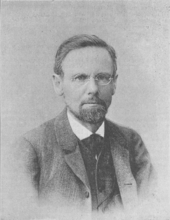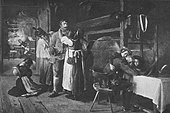Peter Mayr. The landlord at the Mahr
Peter Mayr. Der Wirt an der Mahr is a novel by the Austrian writer Peter Rosegger , which was published by A. Hartleben in Vienna in 1891 .
Historical background
With the Peace of Pressburg , France and Austria ended the Third Coalition War on December 26, 1805 . Austria lost Tyrol to the Kingdom of Bavaria . In 1809 the Tyrolean farmers, left alone by their Emperor Franz , fought against the troops of Napoleon and his allies Bavaria and Saxony . In the novel, two battles from the Tyrolean people's uprising , which the South Tyrolean innkeeper Peter Mayr successfully commanded in his closer home - once near Mühlbach and then in the upper Eisack Valley - on the part of the rebellious rural population, are thematized.
content
The location of the action is the Eisackkreis in the Kingdom of Bavaria. Peter Mayr's ancestors were farmers on the Ritten . Together with his wife Notburga, he runs an inn on the Mahr south of Brixen . The marriage of the 42-year-old freedom fighter is blessed with three children - Hans, Marianna and Little Peter.
The strong young maid Hanai works on the farm that belongs to Mayr's inn. The beautiful Anton - Toni or Tonele called - a traveling guitar nspieler from Gurgl - advertises initially unsuccessfully for resolute Hanai. The self-confident girl does not like a beggar who moves from one pub to another as a man.
Battle near Mühlbach
In the harvest month of 1809, Peter Mayr received encrypted mail from Villach . He and Andreas Hofer are encouraged to start immediately. Archduke Johann of Austria would set out from Grätz with Austrian troops in the direction of Tyrol.
The maid Hanai intervenes in the fighting. Armed with her three-pronged stable fork, she denies the French and Bavarians access to the Spinges Church. A Frenchman turns away with the cry “Une pucelle d'Orléans tyrolienne!”.
After the bloody slaughter, Peter Mayr was able to drive Bavaria out of South Tyrol. But the French stay. Peter Mayr belongs to the newly formed Tyrolean government. The winners from Mühlbach have their hands full. Corpses have to be buried. There is not enough money and the Archduke stayed away. Destroyed bridges have to be repaired, residents of burned down houses have to be accommodated. Peter Mayr has not seen his own family since the battle. During the fighting near Mühlbach, Mayr's oldest son, 10-year-old Hans, ran away from home and cannot be found. The boy had thrown himself into the fray. When the Bavarians looked for their father, Hans had misled them; had given the shot Tyrolean Hasel-Steff for the father. Afterwards, the Kreuzwirt von Brixen had worked hard for Hans at Mayr; underlined the boy's stratagem. The father, however, refused to accept the son's lie and had sent him home to his mother with the remark: “If you've done something good, then you can come back.” Hans had never come home.
Sepp Kulber brings news from Andreas Hofer's Tyrolean struggle north of the Brenner . The small, pale, black-eyed Kulber had previously stayed in Bavaria for a long time. The Bavarians later used him as a tax collector in Bruneck and then suspended him from duty. Peter Rosegger writes that Kulber probably hated Bavaria more than he loved Tyroleans. In any case, the former tax collector brings the news that the French and Bavarians have a lot of respect for Andreas Hofer. However, many enemies entered the country via the Strub Pass . Kulber reads a message of peace from His Majesty the Emperor Franz and His Majesty the King Maximilian Josef the First of Bavaria to the speechless South Tyrolean freedom fighters : "Tyrol has ceded Austria to Bavaria for ever."
Notburga leaves her two children in Hanai's care and goes looking for Hans. Anton is also looking for Hans and finds him.
Hanai listens to Anton. Notburga does not allow the couple to sleep together any longer in the stable. May it get married soon. Notburga donates two hundred guilders for its own small farm near Brixen. That will probably not be enough, says the practical Hanai.
Battle in the Eisack Gorge
After the battle near Mühlbach, in which numerous Tyrolean farmers fell, Peter Mayr is struggling to close the gap in his fighting force. The freedom fighter sets out for the mountains and finds open ears among the young farmers. But - having returned to the Mahr - he is disgusted by the gruesome bloodshed. When Sepp Kulber constantly asked him to take up arms against the countless foreign invaders, he no longer wanted to. Peter Mayr wants to give up his inn and buy a farm on the Renon.
Kulber doesn't give up. Finally, Peter Mayr agrees. Under his guidance, the Tyrolean farmers let an artificially created mud fall down on the French and Bavarians who were penetrating the Eisack gorge from the Brenner. 1500 men, mostly Saxons in the ranks of the Bavarians, are killed. Marshal Lefebvre - the dreaded Löw Befer, commander of the Bavarian troops - is said to be among the dead .
Peter Mayr, marching through Vahrn on his way home , pauses at a cross pillar and prays to the Virgin Mary : He acted in "terrible self-defense". The head of his “comrade, recruiter and urgeon” Kulber, speared on a fence, grins at him on the way. After such a renewed horror of war, the armed struggle is finally over for Peter Mayr. The Tyrolean farmers' government no longer exists. Andreas Hofer fled Innsbruck into the mountains, lives up in the distant mountains and is taken care of from the Passeier Valley . 1500 guilders are exposed on his head. In Brixen it is posted: 2000 guilders are paid for the head of Peter Mayr. Brother -in-law Augustin asks the freedom fighter to hide under the Schrutthorn . A shelter is prepared. Mayr leaves the family with a heavy heart.
The guitar player Tonele from Gurgl wants to earn 2000 guilders because Hanai does not take a beggar man. On the way to see a relative, he stops at Albeins - as is his custom - and reveals Mayr's whereabouts to Bayern - the Rosshöhle behind the Hochkofel. This is of course made up. Because Mayr has left his hiding place. Only the refugee knows his way: to Carinthia . The "farmer chief" Mayr is actually discovered in the horse cave and taken to Bozen in prison . There, a French court martial, presided over by General Count Louis Baraguay , known as the French lion, sentenced him to death by shooting for the death of 1,500 people in a landslide in peacetime .
Notburga travels to Bozen with the children, but fails at the guard in front of the general's house. The Tonele overcomes this; meanwhile arrived in Bozen. He wants to collect his Judas wages and meets Notburga. That guard recognizes him. Tonele and Hanai had given first aid to the same French in Mühlbach. The Countess Baraguay - like Notburga pregnant - got her husband to have the court martial in the Peter Mayr case reopened at Notburga's plea. However, the delinquent cannot lie - as required - and goes straight to his death.
Side stories
Romanglobal is the story of Field Father Augustin alone. This is Notburga's biological brother. The clergyman swaps the robe for a combat suit, fights with Mühlbach and also acts as a pastor - regardless of whether friend or foe needs to be looked after. Father Augustin even acts - alongside his nephew Hans - as one of the bearers of hope beyond the end of the novel. Augustin takes care of his pregnant sister Notburga and her three children. Otherwise, there are a number of episodes that are worth reading, with which the author would like to underline the horrific Mühlbach battle turmoil realistically.
Moral message of the novel
The moral message in the novel is: You can't go on living with a lie. After the failure of the Tyrolean people's uprising, Peter Mayr could have saved his own head at the last minute by making a false statement under the motto 'I did n't know about the peace agreement between the conflicting parties Austria and Bavaria after the battle at Mühlbach '. Mayr, however, gives his son Hans (who once lied) and the Tyroleans an example through his steadfastness - sticks to the truth and is shot dead by the French for it .
reception
Pail thinks that Rosegger's heroic portrayal of the Tyrolean struggle for freedom against Napoleon's troops seems naive and remarks: "The subtitle A story from the German heroic era mythizes and nationalizes events."
literature
expenditure
- Peter Mayr, the landlord at the Mahr. A story from the German heroic days by Rosegger . L. Staackmann , Leipzig 1906 ( archive.org ).
- Peter Mayr the landlord on the Mahr. A story from the German heroic days. L. Staackmann. Leipzig 1914
- Peter Mayr the landlord on the Mahr. A story from the German heroic days. Tredition publishing house, Hamburg 2011, ISBN 978-3-8424-1996-4
- Karl-Maria Guth (Ed.): Peter Rosegger: Peter Mayr, the landlord on the Mahr. A novel from the time of the Tyrolean struggles for freedom . Verlag Contumax-Hofenberg, Berlin 2017, ISBN 978-3-7437-0936-2
Secondary literature
- Gerhard Pail: Peter Rosegger - a trivial ideologist? P. 61–87 in: Uwe Baur (Ed.), Gerald Schöpfer (Ed.) And Gerhard Pail (Ed.): "Foreign made?" The folk writer Peter Rosegger . Böhlau, Vienna 1988, ISBN 3-205-05091-6
Web links
- Peter Rosegger: Peter Mayr the landlord on the Mahr online with L. Staackmann 1910
Remarks
- ↑ The Mahr is a mound of rubble after a debris flow .
- ^ A Tyrolean maiden from Orléans .
- ↑ The dead live longer. Lefebvre died in Paris in 1820 .
Individual evidence
- ↑ Constantin von Wurzbach : Mayr, Peter . In: Biographisches Lexikon des Kaiserthums Oesterreich . 18th part. Kaiserlich-Königliche Hof- und Staatsdruckerei, Vienna 1868, pp. 164–167 ( digitized version ).
- ↑ Pail, p. 74, 5th Zvu to p. 75, 2nd Zvo


